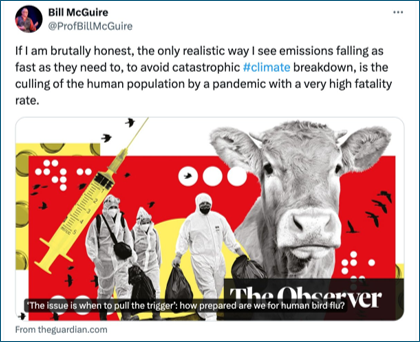Over the weekend, Bill McGuire, an Emeritus Professor of Geophysical & Climate Hazards at University College London, set X/Twitter afire with the following Tweet, which foresees the “culling of the human population” as the “only realistic” way to address climate change — a Tweet which he later deleted:
The issue of “overpopulation” is one that has long been present in the climate science community, but is rarely discussed in public in the stark terms employed by McGuire. Yes, I put the word “overpopulation” into scare quotes because it is not a meaningful analytical concept but it is one with a lot of symbolic baggage.1
I don’t want to be too harsh on McGuire as he simply articulated what some in the climate science community actually believe and had the unfortunate experience of committing a Kinsley gaffe. A view that climate change is really about overpopulation is not that uncommon among climate researchers.
Let’s go back in time.
Writing in 1990, only two years after the Intergovernmental Panel on Climate Change (IPCC) was created and two years before the Rio Earth Summit, atmospheric scientist and president of the National Academy of Engineering, Robert M. White2 warned that,
The climate warming issue has also become a surrogate for other agendas. . . [Proponents argue that] because population growth is at the root of the environmental pressures being experienced by the world, prospects for stabilizing the climate and arresting the deterioration of the habitability of the planet are hopeless, argue the proponents, without population control.
Indeed, writing just one year later, the late Stephen Schneider suggested several strategies for addressing climate change including “curtailing population growth” and
“in developing countries they involve forsaking fossil fuels as a basis for development, as well as dramatic slashing of population growth rates as a strategy for addressing climate change.”
Concerns about “overpopulation” inevitably involve stoking fears of too many poor people who are going to overrun those of us who live in wealthy countries. Today that can be seen in the common tropes about climate-determined migration. The concept of “overpopulation'“ is historically laden with racism and colonialism.
More recently, renowned climate scientist Michael E. Mann suggested that “the natural carrying capacity of the planet … is maybe a billion people.”3 The notion of “carrying capacity” is itself a Malthusian tell — a seemingly scientific metric often used to justify population policies or control based on a hard planetary limit.
Sayre (2008) observes of the concept of “carrying capacity”:
“It is unclear whether the concept of carrying capacity has any content at all without the idealism, stasis, and numerical expression that have clung to it throughout its history. What is clear is that it is a very dull tool for understanding the complex interrelations of humans with the face of the earth.”
Harvard historian Naomi Oreskes was far more explicit when she recently lamented, “Eight Billion People in the World Is a Crisis, Not an Achievement. More people will not solve the problem of too many people.” And along the same lines, Johan Rockström, director of the Potsdam Institute for Climate Impact Research, explicitly connects his “planetary boundaries” concept to the work of neo-Malthusians Dennis and Donna Meadows of the Club of Rome (Limits to Growth).
Once you start looking, you will see that neo-Malthusianism is disturbingly common among prominent climate researchers. The notion of population management is never far behind — almost always focused on poorer countries.
The Fifth Assessment Report of the IPCC in 2014 apparently included an Easter egg for neo-Malthusians and degrowthers (shown below), by singling out population and economic growth as factors underlying increasing greenhouse gas emissions while ignoring the other two factors of the Kaya Identity (and far more important for decarbonization) — energy intensity and carbon intensity.

Following the release of the IPCC AR6 in 2021, Simon Lewis of University College London argued that the IPCC had changed course from the views expressed in AR5 and was no longer emphasizing population growth:
Such dangerous misunderstandings are no longer present in the summary report. Seven years on, these old “blame the poor” arguments increasingly seem like a relic of a previous age.
Of course, the IPCC does not always speak with one voice. In a response to Lewis, Philip Cafaro, of Colorado State University, argues (for the “overpopulation project”) that the IPCC AR6 “censored” its conclusions on population growth and suggested that Lewis deserves a place in hell for his views — Demonstrating continued disagreement about neo-Malthusianism and the vitriol that sometimes accompanies these issues.
In 2021 Suzanne Schultz, of Goethe University, observed more generally of the climate discussion:
“the transnational neo-Malthusian knowledge elite, which has been firmly anchored in the think tanks, institutions and networks of the population establishment for decades, is currently once again making its voice heard in the debate on climate change”
Neo-Malthusian sentiments have deep roots. The January, 1972 issue of The Ecologist outlines a manifesto — emphasizing overpopulation and degrowth — which has reverberations a half century later. The opening lines could easily have been written today:
“if current trends are allowed to persist, the breakdown of society and the irreversible disruption of the life-support systems on this planet, possibly by the end of the century, certainly within the lifetimes of our children, are inevitable.”
Many aspects of its “blueprint for survival” can also be seen today in demands of environmental activists, including within the climate science community, such as to “just stop oil.” Similarly, the looming apocalypse which motivates the need for societal transformation has been moved from 2000 to when the world crosses various temperature thresholds.
Nils Petter Gleditsch, of the Peace Research Institute Oslo & Norwegian University of Science and Technology, argues that today’s apparent resurgence of neo-Malthusianism is just a recent version of a longstanding debate between environmental optimists and pessimists:
Compared to previous rounds of the environmental debate between pessimists and optimists, the stakes seem higher this time because of the global nature of the problem and the temptation to engage in free-riding in the efforts to reduce the emissions of greenhouse gases. Yet, the debate continues along the same dividing-lines. The pessimists are often charged with alarmism and misanthropy; the optimists are accused of complacency. Both indictments have some plausibility. Further polarization of the debate will lead us nowhere.
I am unapologetically in the optimist camp — people are amazing. We should not lament the fact that there are more than 8 billion of us, but rather work together to ensure bright futures for as many as possible.
Calls for the “culling” of humans or claims that the “carrying capacity” of the earth is just 1 billion are not just ridiculous, but they can shape how climate research and policies are viewed by broader publics — and not in a good way. The climate community needs to do a much better job in distancing itself from its misanthropic wing, else risk being defined by those few extreme views.
❤️Click the heart if you have seen Logan’s Run - the original climate culling movie!
Comments, critique, alternative views are invited and welcome. Always be respectful of others and help keep THB’s comment sections among the best anywhere!
THB is reader supported. So go on, please support!!
See my posts on how the population bomb was born and the global population crisis that never was. I also highly recommend Building the Population Bomb by Emily Klancher Merchant.
I had the opportunity to interact with White professionally early in my career, when he was old and I was young. Delightfully old school, as we’d say today, which is a huge compliment. Science first. I highly recommend his article linked here, apologies for any paywall.
Here is the full quote in which Mann projects that unmitigated climate change will kill more than 7 billion people: “We can support eight plus billion people because we have all of this infrastructure, agricultural infrastructure, engineering. But it's fragile, right? Because if the planet warms dramatically and that infrastructure no longer remains viable, then we can no longer support that elevated carrying capacity. Then we revert to the natural carrying capacity of the planet, which is maybe a billion people. And you think about that. The planet without our infrastructure, without our technology, probably can't support more than a billion people. We've got more than 8 billion people. That's why we can't afford to destabilize the infrastructure that supports human civilization today. And that's what dramatic warming, that's what unmitigated climate change will do.”






Using "renowned" to describe Michael Mann is not an adjective that many would use; his position on population being but one reason that he does not warrant such an honorific.
Mann seems like a venal character, to me anyway. He does not like any arguments against his views whatsoever and uses scientism broadly. The motion that he and his ilk have somehow determined how many humans the Earth can support is laughably arrogant. Very intelligent, educated people have the reverse problem that the uneducated have; they easily convince.themsrlves of their own primacy in every matter, and bend their perception of reality to their ideas.
I am depressed at such a lack of humility on display within the climate scientist community, but not surprised. I well remember the imminent ice age and depopulation bomb forecasted by scientists in the 1970s. Eugenics is a plaything of faux science in rich countries.